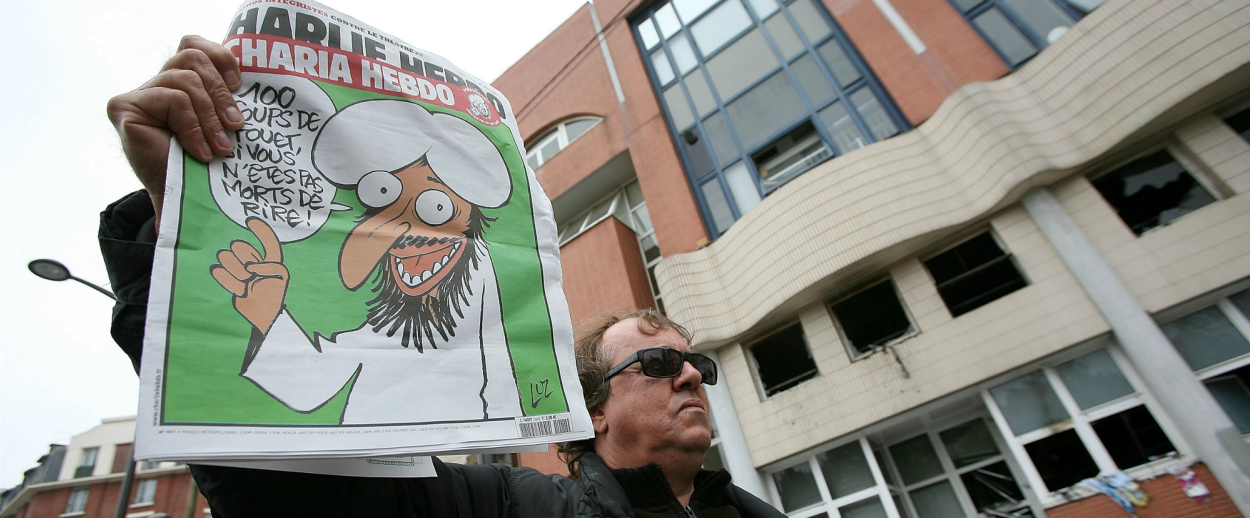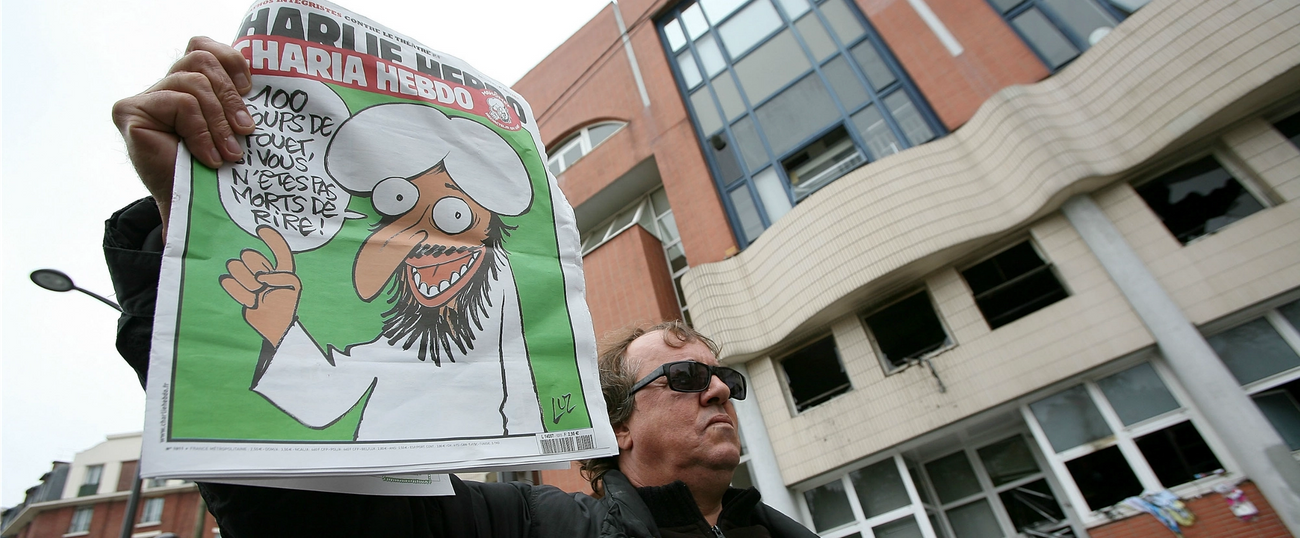Imagine a Fist Punching Down at Dead Cartoonists Forever
Five years later, it’s clear that the response to the Charlie Hebdo attack normalized anti-free speech ideas that have become more influential in progressive discourse




This article has been updated since it was originally published in 2019.
Today marks the five-year anniversary of the Charlie Hebdo massacre when the staff of a satirical French comics publication was murdered along with several bystanders, by Islamist terrorists. The killers were the brothers Saïd and Chérif Kouachi who acted on their offense at Hebdo’s cartoon depictions of the Muslim Prophet Muhammad by killing 12 people in a shooting rampage that began inside Hebdo’s offices and continued into the Paris streets where a bystander heard them cry out: We have avenged the Prophet Muhammad. We have killed Charlie Hebdo!
The tragedy produced a slogan—je suis Charlie Hebdo—and brought world leaders together to march and pose for photographs, but even five years later its full import has not yet been understood. The Hebdo attack was a pivotal historical moment, not because of the event itself—practically a jihadi cliche in which a symbolic offense provoked an absurd overreaction directed at defenseless targets. What was unique and consequential was the response from the cultural and ethical minders of the Western elite. In America, the aftermath of the Hebdo killings galvanized a set of opposing ideas about the nature of violence and victimhood, and the value of free expression. In the years since, Hebdo’s defenders have clearly been losing ground.
Almost immediately after the attacks, a political reaction coalesced in the American and Western press around the idea that the cartoonists really had gone too far with their drawings. While dutifully condemning the dreadful murders, certain sensitive observers, including New Yorker writers, countless online scribblers, noted poets, prestigious professors, PEN award winners, and other highly cultured and impeccably credentialed figures, hastened to point out that, yes, yes, it was a very nasty thing, the shooting down in cold blood of bawdy and insensitive comic strip artists, but the cartoonists were, nevertheless, rightfully understood, enacting their own form of violence in their drawings. This interpretation of the deliberately planned mass shooting was expressed clearly, though never quite so honestly, through an echo chamber of columns, essays, tweets and public statements that blurred or erased the difference between speech and violence.
When PEN, an organization created to protect writers and defend their freedoms, decided to give Charlie Hebdo an award for courage, objections surfaced immediately. “I can hardly be alone in considering Charlie Hebdo’s cartoons that satirize Islam to be not merely tasteless and brainless but brainlessly reckless as well,” wrote the author and PEN member, Deborah Eisenberg. “Was it the primary purpose of the magazine to mortify and inflame a marginalized demographic?” Eisenberg, who refused to simply state her accusation, pretended to ask. “It would seem not. And yet the staff apparently considered the context of their satire and its wide-ranging potential consequences to be insignificant, or even an inducement to redouble their efforts – as if it were of paramount importance to demonstrate the right to smoke a cigarette by dropping your lit match into a dry forest.”
It’s true that Eisenberg’s statement maligning the dead Hebdo staffers’ recklessness was made in 2015, several years before the #metoo movement established a clear moral standard against blaming victims for the crimes of their abusers—but, then, what was her excuse for comparing European Muslims to a pile of dead leaves, mere debris littering the ground?
At the bottom of Eisenberg’s charge of recklessness and fire setting is the idea that Hebdo’s penchant for harshly mocking Islam was not merely obscene or offensive, but a form of persecution that participated in the systemic oppression of Muslims carried out by French authorities and Western governments everywhere. By this reversal, the dead artists became agents of the state—their corpses rearranged to put them in league with the same government they had cursed, pissed and shit on, and violated in countless unmentionable ways when they were still alive and able to draw their stupid comics. Rather than being seen as marginal characters working on a marginal, subversive comics paper, the Hebdo staffers were hoisted up into symbols of French imperialism. Conveniently dead symbols who therefore could not protest the charge that they had it coming, or object that maybe 4th generation Fanonist theories about the white gaze and the subaltern spoke more to the psychology of New Yorker writers and tenured academics than it did to the motivations of the Kouachi brothers.
The belief that art can be a form of violence is now a mainstay on elite college campuses and across the cultural landscape. But if you are wondering when it took root, I suggest that it was in the aftermath of the Hebdo murders when the idea of “not punching down,” went from a reasonable bit of common sense, to a ubiquitous phrase deployed in the absence of argument and treated as a matter of moral law. Certainly, talk about punching down was a useful way to say that the Hebdo crew had it coming without actually having to come out and say that. BOP! And to blur the difference between cartoon punches and actual blood-drawing violence. BAM!
You can’t get much further down than dead artists at an alt-Comix weekly but wow, oh man, did a lot of people take the opportunity to punch those Froggy cartoonist corpses while they were still fresh in the ground.
Before the alt-right and Trump, before trolls and meme wars, the arguments deployed to attack Hebdo and reposition jihadist murderers as victims formalized a set of illiberal precepts as the default position for many progressives. The ideas taken up by the chorus then are even more influential today in discussions of race, gender, sexual violence and any other issue where speech can supposedly be “weaponized.”
Free speech, once almost universally seen as indispensable in free societies, is now commonly derided as a tool used by the privileged to subjugate already marginalized groups. There were earlier precedents for this attitude like the Salman Rushdie affair, but those occurred in a slower moving print and television era. In the digital age, where information technologies enforce uniformity of opinion through a collective process of social automation, the language and arguments used to condemn Hebdo spread rapidly and have since reappeared in nearly every new episode of the culture war.
What had previously been somewhat radical or obscure interpretations of speech and violence were popularized over social media through the Hebdo controversy and adopted by people wishing to signal their assent to a broader set of political principles within a social grouping on the left. Just recently, it was there in the widespread criticisms of Dave Chapelle’s latest standup special in which he, a Black Muslim man, apparently had the temerity to make fun of people with less privileged identities. It would be a real tragedy, of course, if Chapelle got murdered for his jokes...but I am curious to know exactly who, in the ranks of the media and intelligentsia, would take the opportunity to urge the public to please consider the context in which the comedian’s reckless humor had re-victimized already marginalized people.
Right there alongside the reversal of murderer and murdered, oppressor and oppressed in the Hebdo affair, was the denial of victimhood to Jews who had been getting attacked in growing numbers throughout France in the years leading up to the murders but were seen by influential segments of the European and American left as too powerful to really be victims, especially in comparison to their Muslim countrymen.
Two days after the Hebdo massacre, a friend of the Kouachi brothers, Amedy Coulibaly swore his allegiance to ISIS, entered the Hypercacher kosher supermarket in Paris and killed four Jews.
In a sense, Tablet’s reporting on the Hebdo attacks actually began a year before the shooting in their Paris offices. It started in June of 2014 with Marc Weitzmann’s five-part series on growing anti-Semitism in France. But it continued in the aftermath of the killings. Over the course of the following year, essays and articles by Tablet writers like Paul Berman, Liel Liebovitz, Marc Weitzmann, and Vladislav Davidzon analyzed the ideology and cultural ecosystem that shaped killers like the Kouachis, Coulibaly, and Kobili Traoré who in 2017 tortured and murdered the retired schoolteacher Sarah Halimi. It’s clear in retrospect that Tablet’s original mission calling attention to the dire situation for French Jews was a grim foreshadowing of what was to come in the Hebdo attacks, an event that, in turn, anticipated what came after it, including the mass cultural derangement that has made it so hard for some people to decide just what level of punishment bad cartoonists deserve.
Fin
***
Here, in one place, is a partial collection of some of Tablet’s best writing from those days.
Je Suis Charlie: The massacre in Paris and the freedom to say stupid things, By Liel Leibovitz
The Frightening Reality for the Jews of France: A year of anti-Semitism, violence, and incitement in France, By Stephanie Butnick
The Charlie Cover: Slander, ridicule, and terror in post-1968 France, By Paul Berman
In Paris, PEN Boycott Makes Americans Look Like Crude Provincials: Why the political and cultural battles being fought here have nothing to do with what happened over there, By Vladislav Davidzon
Jews, Muslims, Liberals, PEN Boycotters, Beware: Voltaire Is Laughing at You: Is the Enlightenment philosopher having a moment? By Paul Berman
The Failure of Intelligent Explanations: France grapples with the aftermath of attacks that are no longer ‘just against Jews,’ By Marc Weitzmann
Jacob Siegel is Senior Editor of News and The Scroll, Tablet’s daily afternoon news digest, which you can subscribe to here.